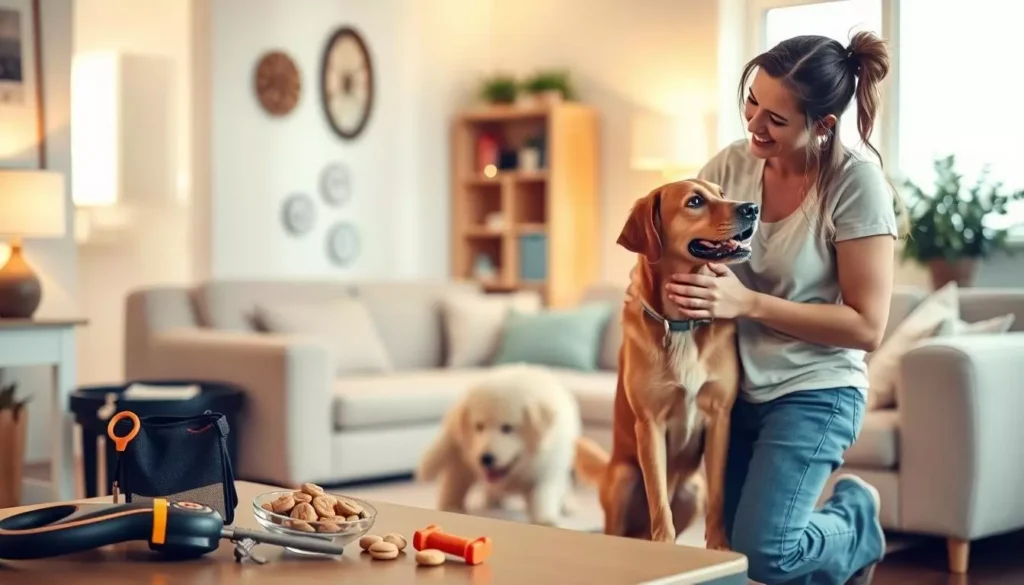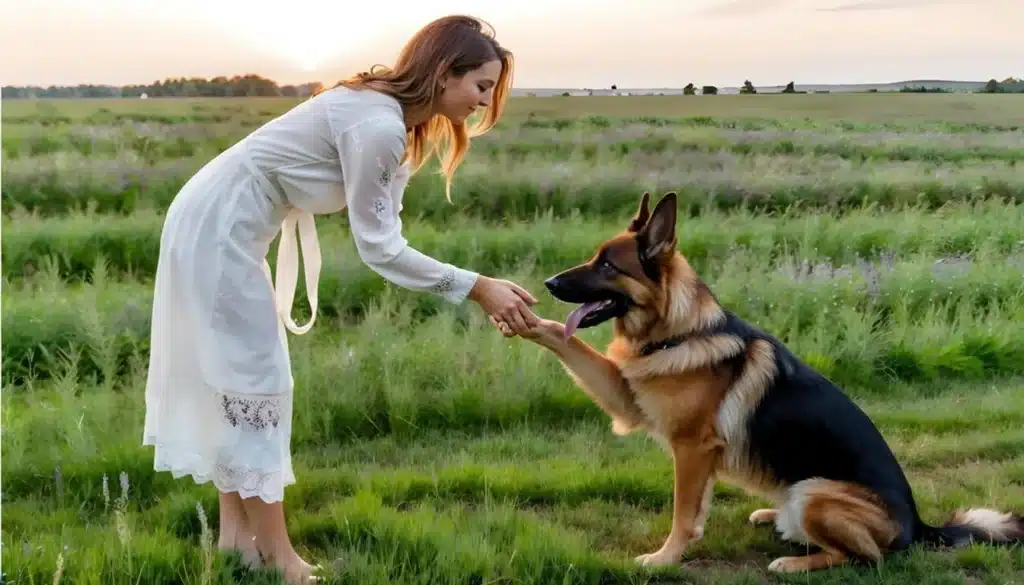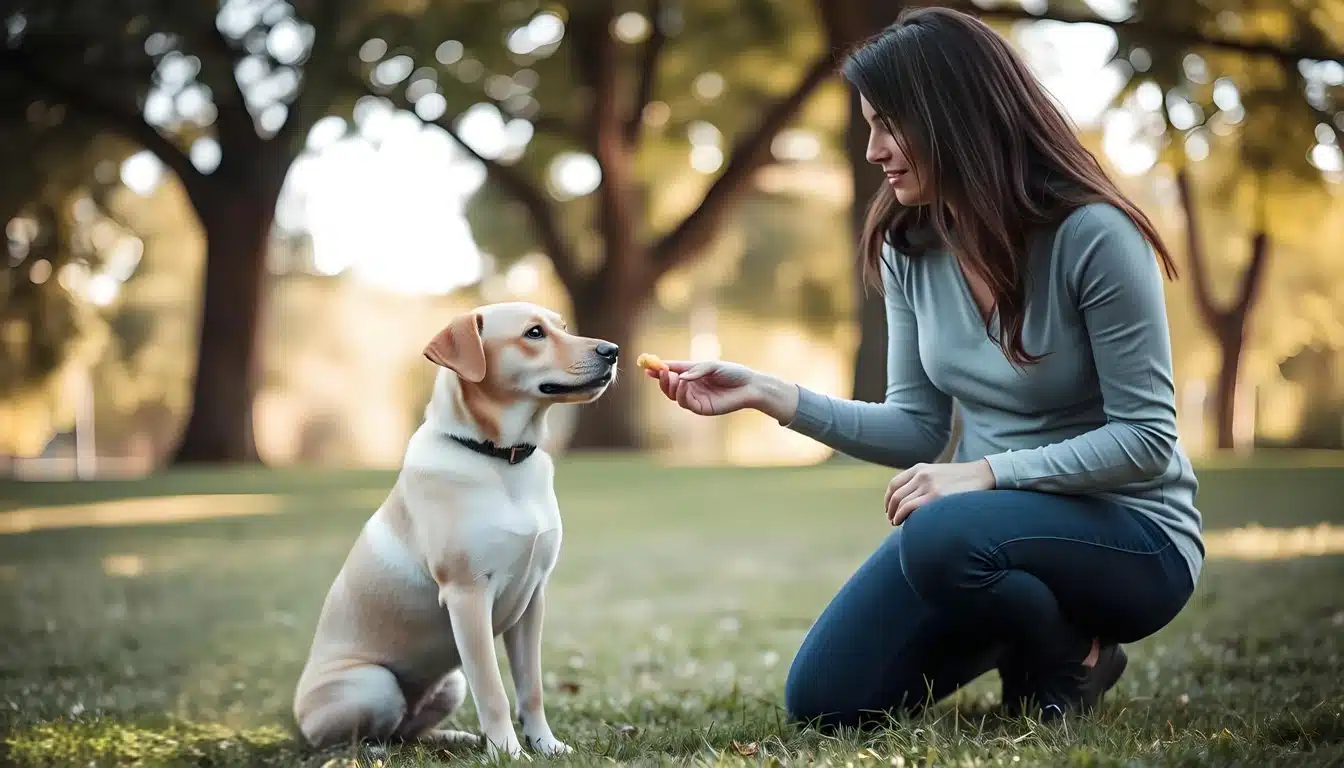The first time I saw my puppy change through dog training, it was amazing. Every bark and leap could be turned into clear communication. It was a big change.
Dog training is more than just teaching commands. It's about creating a special language with your dog. It's about building trust and understanding, not just controlling them.
Dogs are smart and love to learn. Training helps them become confident and well-adjusted family members. It doesn't matter if your dog is a puppy or an adult rescue. Training brings you closer together.
Key Takeaways
- Training builds stronger human-canine relationships
- Dogs learn best through positive reinforcement
- Consistent training reduces behavioral problems
- Mental stimulation is crucial for dog development
- Training can begin at any age
Understanding the Fundamentals of Dog Training
Dog training is a journey into canine psychology that needs patience and understanding. It's not just about teaching commands. It's about building a strong connection and understanding between dog and owner.
Canine psychology shows that dogs learn through complex ways. They learn through association and reinforcement. Knowing these learning processes is key for effective training.
The Science of Canine Learning
Dogs learn in two main ways:
- Classical Conditioning: They link specific stimuli with certain responses.
- Operant Conditioning: They learn from the results of their actions.
Training Methods and Approaches
Exploring positive reinforcement training, I found several important methods:
- Reward-based training
- Clicker training
- Techniques that focus on consistency
| Training Method | Key Characteristics | Effectiveness |
|---|---|---|
| Positive Reinforcement | Rewards good behaviors | High |
| Punishment-based | Stops bad behaviors | Low |
| Balanced Training | Uses rewards and corrections | Moderate |
Role of Positive Reinforcement
Positive reinforcement training is the most humane and effective method. It rewards good behaviors, helping dogs learn fast. This approach strengthens the bond between dog and owner, creating a supportive learning environment.
"Training is not about domination, but communication and mutual respect." - Professional Dog Trainer
Why Dog Training is So Important for Pet Owners

As a dog owner, I've learned that dog training is more than just basic commands. It's key for a happy relationship with your pet. Training helps avoid bad behaviors that could be very sad.
Knowing why dog training is important can save you from big problems. Many dogs are given up or put down because of bad behavior. By training your dog, you can:
- Reduce stress for both dog and owner
- Prevent destructive behaviors
- Enhance communication and mutual understanding
- Create a safer home environment
Professional trainers say early training is crucial. Dog training techniques focus on positive reinforcement and trust. When you understand your dog, you build a stronger bond.
Training is not just about control. It's about making your dog confident and happy. By training, you're investing in a lifelong friendship. You'll avoid frustration and have a happier life with your dog.
Building Strong Bonds Through Training
Training is more than just teaching commands. It's a way to create deep connections with your dog. As a dog owner, I've learned that good training builds trust, understanding, and respect.
Dogs are social creatures that need clear communication and structure. Getting a dog trainer certification can help you understand how to strengthen your bond. Socialization is key for their confidence and social skills.
Strengthening Human-Canine Relationships
Training offers unique chances for connection. Through practice, you and your dog learn each other's language. This builds trust that goes beyond simple commands.
- Establish clear communication patterns
- Create predictable interactions
- Build mutual respect and understanding
Creating Trust and Mutual Understanding
Trust is the base of any strong bond. Positive reinforcement techniques make dogs feel secure and valued. By leading with consistency and clear guidance, you become a trusted friend.
Enhancing Communication Skills
Training improves communication for both you and your dog. You learn to read your dog's cues, and they understand your signals better. This two-way communication deepens your connection, beyond just basic obedience.
"Training is not about controlling your dog, but about understanding and connecting with them." - Professional Dog Trainer
Safety and Control Benefits of Dog Training

Dog training is key for keeping your pet and others safe. It's not just about teaching tricks. It's about changing how your dog acts to keep them safe.
The main safety perks of dog training are:
- Stopping dangerous moments in public
- Teaching recall commands
- Lowering aggressive behavior
- Ensuring safe reactions in surprise situations
Think about your dog running into traffic or meeting an aggressive animal. Good training can prevent these dangers. Recall training is vital for quick control in risky moments.
Dogs that know basic commands are safer. They:
- Don't run off
- Don't bother strangers
- Avoid dangerous animal meetings
- Don't pose a public risk
Spending time on dog training does more than teach tricks. It makes a safer world for your dog and everyone else. Training helps your dog understand what's expected of them, keeping them safe and calm in any situation.
Mental Stimulation and Behavioral Development
Dog training is more than just basic commands. It's about keeping your dog's mind sharp and happy. Puppy training helps create a dog that can think and solve problems.
Dogs need mental challenges to avoid boredom and bad behavior. Dog training classes offer many benefits. They keep your dog's mind sharp and well-adjusted.
Cognitive Benefits of Regular Training
- Improves problem-solving skills
- Enhances memory and learning capabilities
- Reduces anxiety and stress
- Increases mental flexibility
Preventing Boredom and Destructive Behaviors
Mental exercise is as tiring as physical activity. Without it, dogs might chew furniture, bark too much, or dig. Puppy training helps them use their energy in good ways.
| Training Activity | Mental Benefit | Time Investment |
|---|---|---|
| Puzzle Toys | Problem-solving | 15-30 minutes |
| Obedience Training | Cognitive Development | 30-45 minutes |
| Scent Work | Advanced Thinking | 20-40 minutes |
Enhancement of Problem-Solving Skills
Dog training classes do more than teach commands. They help dogs think critically by solving progressive challenges. This keeps their minds active and prevents them from getting dull.
A mentally stimulated dog is a happy dog!
Creating Confident and Well-Adjusted Dogs

Dog obedience training is key to a dog's confidence and happiness. I've seen shy, anxious dogs become confident friends through training.
Building a dog's confidence needs a smart plan. Why is training your dog important? It keeps their mind sharp, helps them understand you, and makes them feel part of the family.
- Positive reinforcement builds trust and security
- Consistent training reduces anxiety
- Reward-based methods enhance a dog's self-esteem
Understanding each dog's personality is crucial. Each dog responds differently to training techniques. So, patience and flexibility are must-haves.
"A confident dog is a happy dog" - Professional Dog Trainer
Good dog training helps dogs in many ways:
- Emotional resilience
- Better social skills
- Improved problem-solving abilities
With time and caring training, your dog will become confident and well-adjusted. They'll handle different places with ease.
Socialization Through Proper Training
Proper socialization techniques is key for a happy dog. Good dog training helps them feel confident and social. This is important for their whole life.
Dogs are social animals but need help in social situations. Early training shapes their behavior and how they react to new things.
Interaction with Other Dogs
Teaching your dog how to act around other dogs is important. Here are some tips:
- Controlled introductions in neutral environments
- Positive reinforcement training methods during social interactions
- Reading and respecting other dogs' body language
- Gradual exposure to different dog personalities
Adapting to Different Environments
Dogs need to get used to different places, like busy streets and quiet parks. Gradual exposure and positive experiences are key to building confidence.
Building Social Confidence
Training helps dogs feel comfortable in the world. Each positive experience makes them more confident and less anxious.
A well-socialized dog is a happy dog!
Prevention and Management of Behavioral Issues
Dog training is key in changing bad behaviors. It helps before these behaviors become too hard to change. Knowing why training is important starts with understanding why dogs act out.
Dogs may act out for many reasons. These include:
- Lack of mental stimulation
- Anxiety or stress
- Insufficient socialization
- Improper communication from owners
Special training can help manage and stop these issues. Early intervention is key to changing bad habits and making a well-adjusted dog.
Some common problems that can be fixed with training are:
- Excessive barking
- Destructive chewing
- Aggression towards people or other dogs
- Separation anxiety
- Inappropriate elimination
Modern dog training has shifted towards positive reinforcement methods, a science-backed approach that rewards desired behaviors. This method is not only more humane but has been shown to increase learning efficiency and reduce stress in dogs, according to comparative studies. Experts suggest a consistent method to tackle these issues. Positive reinforcement helps dogs learn better ways to handle problems. This improves their behavior overall.
Remember, every dog is unique and requires a personalized training approach to successfully modify challenging behaviors.
Spending time on proper training does more than fix immediate problems. It also makes the bond between dog and owner stronger. This leads to a happy and harmonious relationship.
Training Impact on Long-term Dog Welfare
Understanding how dogs think shows us how training affects their life. Good training does more than teach tricks. It shapes their mind and feelings for their whole life.
Looking into why training dogs is key, we find many benefits that last:
- Less anxiety and stress
- More emotional balance
- Improved social skills
- Stronger mental toughness
Studies show that dogs trained with positive methods bond better with their owners. Early training sets the stage for a dog's future behavior. This method stops bad habits and keeps their mind healthy.
"Training is not just about teaching commands, but about creating a lasting bond of trust and understanding." - Professional Dog Trainer
Dogs trained with rewards show:
- More confidence in new places
- Predictable and balanced actions
- Deeper connection with people
By spending time on good training, owners help their dogs' mental health and life quality.
Professional Training vs. Home Training Methods
Finding the right dog training method can be tough for pet owners. You must think about your dog's needs and what you can do. This choice is important.
Professional trainers have skills that home training can't match. Many owners train their dogs well at home. But, some situations need a pro's help.
When to Seek Professional Help
Here are times when you should look for professional dog training:
- Persistent behavioral problems
- Aggressive tendencies
- Difficulty with basic obedience commands
- Lack of socialization skills
Choosing the Right Training Program
When picking a professional trainer, keep these points in mind:
- Verify dog trainer certification credentials
- Check training methodologies
- Review trainer's experience
- Ask for client references
Cost-Benefit Analysis of Professional Training
Professional training might cost more upfront. But, the long-term benefits are worth it. A well-trained dog means less damage and fewer behavioral problems.
Investing in professional dog training is an investment in your pet's future and your relationship.
Professional trainers offer knowledge, structured learning, and tailored strategies. These can change your dog's behavior more than home training can.
Conclusion
Training your dog is more than just teaching commands. It's about building a lifelong partnership based on understanding and communication. This is why training is so important for both your dog's behavior and your relationship with them.
Positive reinforcement training is a great way to raise well-adjusted, confident dogs. By spending time and patience on training, you can change tough behaviors into chances for growth and connection. The skills your dog learns go beyond just following commands. They provide mental stimulation and make your bond stronger.
Every dog, no matter their age or background, can benefit from training. It helps prevent bad behaviors, improves safety, and boosts social skills. I've seen how dedicated training can turn challenges into moments of joy and understanding.
My advice is simple: see training as a journey of learning and connection. Whether you get help from a pro or train at home, the effort you put in today will make your relationship with your dog happier and more harmonious for years.




